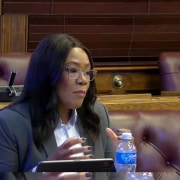|
Getting your Trinity Audio player ready...
|
By Kwazi Dlamini
Auditor-General (AG) Tsakani Maluleke has called on leadership at both political and administrative level to make a determined commitment to tackling the scourge of corruption and irregular expenditure in local government.
The consequences will be dire otherwise.
Delivering her consolidated annual Municipal Finance Management Act (MFMA) report on local government for the financial year 2019-2020, Maluleke said the only way to salvage the deteriorating state of local government is a firm commitment from leadership and diligent follow-through on advisory solutions the Auditor-General of South Africa (AGSA) provides.
“The audit office is convinced that if municipal leaders, supported by their provincial leadership, are fully committed to turning around local government and moving it towards the capable, efficient, ethical and development-oriented institutions envisaged by the Constitution, improvements are bound to follow. We have seen great results where leadership has taken definite strides towards a better future for the communities they serve,” Maluleke said.
The AG remains concerned that recommendations put to municipalities by her office are not implemented. Furthermore, municipalities are still failing to master the basics of financial reporting, and only 28% of municipalities submitted quality financial statements for auditing. Financial reporting has cost local government over R5-billion – this estimate is based only on the salary cost of finance units and the costs of financial reporting consultants, which latter group accounts for 18% of the cost.
Another concerning finding is that only 2% of municipalities had a genuine need for consultants, to bridge the vacancy gap – the other municipalities sought and paid consultants while they have capable finance units. The issue of consultants becomes more alarming when noting that 64% of municipalities failed to provide records on consultants, appointed them too late, or did not manage the consultants’ work efficiently to benefit the municipalities.
Based on the findings, Maluleke said: “The use of consultants is also not necessarily effective.”
Poor record-keeping hampers audits
The biggest frustration the AG encounters is the inability to audit some contracts because municipalities fail to provide documents and evidence to support procurement processes.
“A lack of complete and proper records inevitably leads to unreliable financial reporting during the year and at year-end, which is likely to result in substantial harm to these municipalities and compromise their ability to deliver on their service mandate,” she added.
According to the report, because of poor performance and budgeting practices, and ineffective financial management, some municipalities received conditional grants to enable them to operate and deliver services to communities – but AGSA could not find auditable proof of how the money was used. When audit outcomes remain poor, Maluleke said, the result is poor service delivery.
The AG also highlighted at least five municipalities which have been under administration for over two years. These municipalities, however, maintain a continuous streak of poor performance, and hence the AG has found the administration process to also be ineffective.
Maluleke advised leadership against short-term solutions, as they seemingly drain more money from already strained municipalities. Consultants, additional monitoring and putting municipalities under administration are strategies that have not worked, she said, and leadership must rather set a tone and culture of good governance and accountability, improve financial and performance management and implement appropriate consequences for accountability failures.
Not enough money to meet obligations
One worrying factor the AG noted is that the financial standing of just over a quarter of municipalities are at a stage where they will not be able to meet their obligations. Moreover, half of the municipalities show indications of extreme financial strain, including low debt recovery, operating deficits, and inability to pay creditors.
Maluleke said: “local government loses billions of rand annually because of interest and penalties, which form a significant portion of the R3.47-billion of fruitless and wasteful expenditure reported in 2019-20.”
The AG said this demonstrates that municipalities do not enforce consequence management and urges the incoming administration to prioritise the matter and view this in the same serious light as does AGSA.
She further called on municipal managers to act swiftly to prevent further deterioration of local government and enforce the relevant consequences for those responsible. Should they fail to do so, the AG will implement remedial action.








